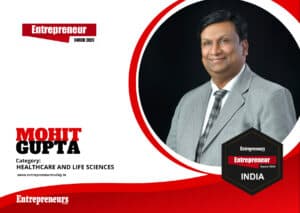“An entrepreneurial journey always requires a strong delivery team. You must surround yourself with critics and smart people. Remember, no idea is a bad idea, no solution is a bad solution, no critic is irrelevant, and no pep talk is childish.”

Entrepreneurs Today reached out to Mohit Gupta, a key figure in the healthcare and life science sectors. With a decade of experience and multiple ventures collectively valued at over $100 million, he has greatly influenced the sectors by creating accessible, high-quality solutions, particularly in nuclear medicine.
A TEDx speaker and economic thought leader, Gupta is also actively involved with premier education and research institutes and contributes to global economic forums focused on shaping macro policies.
About Vitrana Group
Since founding Vitrana in 2014, Mohit has addressed gaps in the pharmacovigilance and life sciences domains. In 2018, he launched Molecular Imaging, a network of nuclear medicine facilities offering affordable PET-CT and gamma scans, effectively democratising access to critical diagnostics. Under his leadership, this enterprise has flourished, with 15 new locations planned within the next two years to meet the rising demand for these essential services.
Vitrana’s microservices-based platform streamlines pharmacovigilance, automating regulatory tasks and integrating advanced risk management methods like Benefit-Risk Management and Real-World Evidence, enabling smooth adaptation to evolving compliance demands.
Operating across five continents, Vitrana serves the top 8 of the top 10 global pharma companies in over 120 countries, enhancing safety, regulatory compliance, and risk management for healthcare systems worldwide.
Interviewer: What was the initial push that got you started?
Mohit: “My early childhood, where I saw my father make an unsuccessful attempt to establish his steel business, was a very strong motivation for me. The extensive exposure to minor successes and major failures left a lasting impression, and I carried that experience with me through my childhood, professional studies, and initial corporate days. I never missed an opportunity to identify with entrepreneurial initiatives.”
As he says, Mohit’s drive resulted from his disillusionment with corporate life. After 17 years, a final corporate setback happened and he was held responsible for a failure he didn’t cause. This pushed him to pursue his own venture. In 2014, with a clear business need, confidence from industry experience, and seed capital, he launched Vitrana.
A Difficult Start
Mohit knew he needed a strong team and initially attracted co-founders who shared his vision. However, lack of operational clarity led some to leave, teaching him hard lessons on equity and co-founder alignment.
Mohit Gupta’s focus on cash flow from day one came from witnessing his family’s failed business ventures and his early U.S. job experience, where he saw how cash burn could undermine growth. Therefore, his approach to building Vitrana was lean and cautious.
Vitrana’s early success was due to the consulting engagements Gupta secured through his industry contacts, which provided initial cash flow. Spotting a regulatory shift in life sciences, the co-founders quickly developed a relevant solution by collaborating with other bootstrapped startups to keep development costs low. Every cent saved in R&D was put toward crafting a viable market solution.
Gupta recalls the loss of a co-founder during COVID-19’s second wave. He reveals,
“My heart still fills with grief when I think about losing our co-founder and dear friend during the second wave of COVID who gave us our first software viable product which became the basis of Vitrana’s success story.”
Bootstrapped with his life savings and loans against his family home, Gupta’s resources were nearly exhausted within six months.
Interviewer: Did bootstrapping the company make things more difficult?
Mohit: “Building brand recognition is also a tough challenge for a bootstrapped venture. Without the capital to spend on marketing or hiring a global sales team, it’s difficult to create market outreach. Convincing customers to work with a company that has immature processes, limited credit, and a small team makes sales almost impossible.”
Drawing on personal connections, he secured an investment from a family member, matching his initial funds. Shortly after, his co-founder brought in Vitrana’s first customer, shifting the company onto a self-sustaining path where growth was driven by cash flow rather than external funding.
During Vitrana’s first year, Mohit Gupta experienced both invaluable support and early setbacks. Alumni, family members, and friends stepped in when resources were thin, though some co-founders exited within six months.
Celebrating Feats
Vitrana has achieved a significant global impact, supporting clients across 120 countries and five continents.
The company processes 10 million adverse events annually, ensuring compliance with regulatory standards to maintain patient safety. Vitrana played a critical role in managing the risk and regulatory compliance for COVID-19 vaccines, working closely with global manufacturers to address pandemic challenges.
In the nuclear medicine space, Molecular Imaging has made services like PET-CT and gamma scans more accessible and affordable, currently handling 50% of the nuclear scan volume in the NCR region, greatly improving healthcare accessibility.
Interviewer: Is there a non-quantitative yardstick that helps you gauge your success or impact?
Mohit: “We focus on keeping our customers satisfied and ensuring they continue to work with us. Repeat business is a clear sign that we are meeting or exceeding customer expectations.”
A New Dawn
“Our software platform initiative is on the verge of global expansion, with new delivery locations being set up in Europe, South America, and the Far East.”
In our freewheeling chat, Mohit shares his plans for Vitrana going forward. Vitrana is focusing on expanding its global partner program to offer customers a wider range of services through its enterprise software platform.
The company is also ramping up research and development efforts with contract research organizations, targeting advanced solutions in signalling, benefit-risk management, additional risk minimization measures, and real-world evidence.
In healthcare diagnostics, Molecular Imaging plans to broaden its ecosystem, including radiopharmaceutical manufacturing, AI-enabled image processing, automated operations, and integrated nuclear therapy services. Over the next four years, it aims to extend nuclear medicine services to 50 new locations.
Moreover, Molecular is partnering with OEMs to co-develop AI-driven software and radiopharmaceutical devices, while collaborating with academic institutions to create advanced training centres for nuclear medicine professionals.
Takeaways
Mohit talks about the two key lessons from his journey that stand out the most. The first is the importance of identifying and addressing the most urgent business needs. By focusing on a critical demand, even a young and immature enterprise can establish its identity and begin building a solid foundation, allowing weaknesses to be overlooked by the market.
The second lesson is that entrepreneurial ideas evolve over time. You won’t have complete clarity on your final product or development approach at the start. What’s crucial is to embrace change, allow the idea to grow, and surround yourself with the right people who can help refine and transform it into a complete solution. What we offer today is far different from where we started.
Lastly, as he signs off, he says,
“Be fearless in pursuing your ideas. Persistence and resilience are key to staying motivated through the numerous failures and moments of loneliness you will encounter as you push forward to realize your dreams. There is always a new way to serve the market—it’s not always about discovering new demand, but rather finding a unique approach to service that demand, which will set you apart and help you become recognized as a market leader.”







